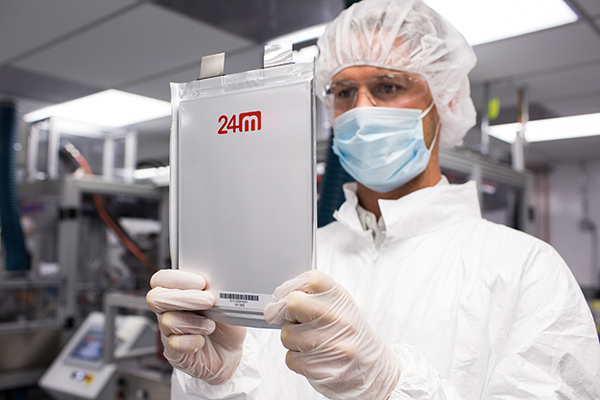 24M has emerged from stealth mode to introduce the semisolid lithium-ion cell, a technology that solves the challenge of energy storage by enabling a new, cost-effective class of the lithium-ion battery. 24M’s semisolid lithium-ion is a significant advancement in lithium-ion technology and combines an overhaul in battery cell design with a series of manufacturing innovations that, when fully implemented, may slash today’s lithium-ion costs by 50 percent and improve the performance of lithium-ion batteries. The technology will accelerate the global adoption of affordable energy storage.
24M has emerged from stealth mode to introduce the semisolid lithium-ion cell, a technology that solves the challenge of energy storage by enabling a new, cost-effective class of the lithium-ion battery. 24M’s semisolid lithium-ion is a significant advancement in lithium-ion technology and combines an overhaul in battery cell design with a series of manufacturing innovations that, when fully implemented, may slash today’s lithium-ion costs by 50 percent and improve the performance of lithium-ion batteries. The technology will accelerate the global adoption of affordable energy storage.
“The lithium-ion battery is a brilliant, enabling technology, but its economics are flawed. It’s prohibitively expensive; it’s cumbersome and inefficient to make; and today’s version is approaching the limits of its cost reductions,” said Dr. Yet-Ming Chiang, 24M’s Chief Scientist. “24M has fixed the flaws. We’ve made the world’s favorite battery better, fundamentally changing its cost curve by designing a more elegant and simpler cell and then making the batteries the right way, the way they should have been made from day one.”
24M’s cell design is made possible by the semisolid thick electrode, a material science innovation originating in Dr. Chiang’s lab at MIT. Conventional lithium-ion battery cells have a large fraction of inactive, non-charge carrying materials, supporting metals and plastics, that are layered within a cell’s casing. Those inactive materials are expensive and wasteful. With the invention of the semisolid thick electrode, 24M eliminates more than 80 percent of these inactive materials and increases the active layer thickness over traditional lithium-ion by up to 5 times. Using thick electrodes, the cell also stores more energy, bettering the performance of the battery as well as its cost.
The simplicity of 24M’s new cell design likewise begets a radically simplified advanced manufacturing process. The traditional method for making lithium-ion batteries takes days, is extremely capital-intensive and must run at high-volume to achieve economies of scale. Start to finish, 24M’s cell creation takes one-fifth of the time of a conventional battery. Because semisolid lithium-ion doesn’t require binding, drying, solvent recovery or calendaring, it removes entire steps in the manufacturing process.
While the removal of manufacturing steps certainly contributes to lower capex, eliminating the need for entire plants makes semisolid lithium-ion ultra-low cost. A 24M factory requires about one-tenth the investment of a conventional plant. Manufacturers can scale in small steps to match supply to demand, making lithium-ion cost effective even at low-volume production.
“We give the architects of our energy future everything they love about lithium-ion at a cost they love too,” said Throop Wilder, 24M’s CEO. “Together, our inventions achieve what lithium-ion has yet to do, meet the ultra-low cost targets of the grid and transportation industries. By 2020 our battery costs will be less than $100 a kilowatt-hour (kWh). We’re emerging at the right time with the right technology.”
Since its founding in 2010, 24M has raised $50 million in private capital, closing Series A and B rounds, from Charles River Ventures, North Bridge Venture Partners and industrial partners. The company is also the recipient of a $4.5 million grant from the US Department of Energy. 24M’s cells are currently undergoing customer trials with large, global integrators of power systems for the grid. The company now employs more than 50 people and runs a fully automated manufacturing line from its 32,000 square foot facility in Cambridge, Massachusetts.







